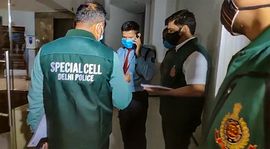On May 24, the Delhi Police, which comes under the Union home ministry, raided the Delhi offices of Twitter India. The timing of the raid was such that one could not but help speculate that there was a connection between the raid and the fact that Twitter had punctured an embarrassing hole in the BJP’s ‘Congress toolkit’ conspiracy that was being peddled on Twitter with the hashtag #CongressToolkitExposed. By marking the tweets of several BJP functionaries like Sambit Patra, Vinay Sahasrabuddhe, Priti Gandhi, Charu Pragya, Sunil Deodhar and Kuljeet Chahal as ‘manipulated media’, Twitter declared the conspiracy was fake.
The opposition, liberal media outlets and several private Twitter users spared no time in rubbing the BJP’s nose in this very obvious snub. In a particularly indiscreet response, the IT ministry asked Twitter to drop the ‘manipulated media’ tags, but Twitter did not relent. So, on May 24, Twitter’s empty Delhi offices (lockdown, remember!) were raided by Delhi Police.
Aside from the petty vindictiveness that is now a recognisable trait in the Central government’s response to any criticism, the raid goes to show the power of social media to hold governments accountable. Only days ago, more than one clip of police brutality and abuse of power by IAS officers and the police in UP, Bihar, Chhattisgarh and Madhya Pradesh went viral on Twitter, prompting—in at least two cases—an apology and enquiries. The phone camera and social media have given citizens the power to hold a mirror to those in power. There are innumerable examples of social media users busting fake news and highlighting abuse of power by agencies.
It is actually entirely understandable why the mere 280 characters of Twitter’s tweet-astra rile the government so much. Over the last few years there has been no greater lie-detector for the government’s falsifications and unfulfilled promises than Twitter archives and tweeted videos and images that proved that rallies by mass leaders went unattended, and that conditions in hospitals were abysmal. More damning, tweets of numerous pyres disproved the government’s figures on Covid deaths.
In a deliciously ironic turn of events, a government that used social media so effectively to build an impression of invincibility and mass appeal, has now been exposed—not just in its utter failure to deal with the pandemic, but also in its role of credibly adding speed to the pandemic’s crawl by organising super spreader events like the Kumbh Mela and massive campaign rallies during the West Bengal elections.
And where the government has failed, citizens have stepped in. Regular people have taken time out and made efforts to help total strangers—either by supplying oxygen tanks and concentrators, amplifying requests for SOS interventions, making calls to influential people, supplying free food to Covid households or simply verifying leads. Then there are some opposition leaders and activists like B.V. Srinivas of the Youth Congress, and Dilip Pandey and Sanjay Singh of the Aam Aadmi Party and many others who have activated their teams and networks into providing yeoman service to hapless patients and their families. Srinivas and Pandey were also questioned by the Delhi Police regarding their relief work.
The efforts and largesse of these citizens and activists have only served to bring into sharper relief the seeming callousness and cruelty of a government that appears remorseless and is only interested in passing the buck and managing its own image. And, as we continue to be unprepared for a third wave of the virus and face a shortage of vaccines, instead of intimidating those who will not toe its line, perhaps the government should ask itself some hard questions. If citizens and opposition party activists must deal with a national crisis, what did we vote this government into power for?
The writer is an award-winning Bollywood actor and sometime writer and social commentator.


